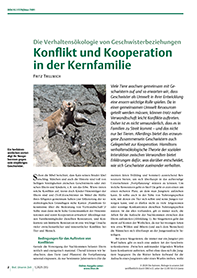Behavioural ecology and relationships between siblings
DOI:
https://doi.org/10.11576/biuz-7691Keywords:
Verhaltensökologie, Soziobiologie, Konflikt, Kooperation, Eltern-Kind-Konflikt, Geschwister, RessourcenkonkurrenzAbstract
Competition and cooperation are ubiquitous among siblings in families. Ecological factors (e.g. the availability of food) drive selection and determine whether either competition or cooperation will prevail. The sociobiological theory shows that the balance between cooperation and competition is influenced by the genetic relatedness within a brood. Parents often produce “optimistic” brood sizes, as if plenty of food were available, and they leave it to competition within the brood to adapt the number of offspring to the prevailing ecological conditions. Examples from a variety of bird and mammal species demonstrate how siblings compete for limited resources which parents can offer them (like food or warmth). On the one hand, this can lead to deadly conflicts, on the other hand, young animals are only able to make their parents feed them sufficiently, if they do it together. Therefore – with the exception of the cuckoo – some parasitic bird species let a few host chicks live. Cooperation between siblings can be found, when it comes to keeping each other warm, which is vital for the survival of small young animals. In order to comprehend the balance between cooperation and conflict or the prevalence of one of these kinds of interactions, one has to understand the ecological conditions, the genetic relatedness within the brood, and the fitness consequences for all the family members.


